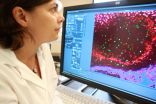New cancer treatment and prevention studies signal major advances for children and adults
ASCO releases around 5,000 studies for its 51st Annual Meeting
2015-05-14
(Press-News.org) ALEXANDRIA, Va. - The American Society of Clinical Oncology (ASCO) today announced results from four major studies to be presented at ASCO's 51st Annual Meeting, May 29-June 2, in Chicago. Findings showed that use of a widely available vitamin pill reduces the risk of non-melanoma skin cancers; that early chemotherapy extends the lives of men with advanced prostate cancers; and that new therapies can improve outcomes for children with a rare form of kidney cancer and adults with relapsed multiple myeloma.
The studies are among the around 5,000 abstracts publicly released today in advance of the meeting on ASCO's website at abstracts.asco.org. Other major research, including studies selected for the meeting's Plenary Session, will be released as Late-Breaking Abstracts on-site at Chicago's McCormick Place and online on a rolling basis throughout the meeting. Around 25,000 oncology professionals are expected at the meeting, which focuses on the theme Illumination and Innovation.
"Trials like these are engines of progress for people with cancer of all ages," said ASCO President Peter Paul Yu, MD, FACP, FASCO. "In just four studies, we see the potential to spare thousands of people the stress and complications of a new cancer diagnosis, and to extend the lives of children and adults facing cancer in its most daunting forms. At ASCO's meeting in Chicago, we'll continue to see the transformative power of investments in cancer research and care."
"We're in an era of cutting-edge precision medicine, yet we can still achieve meaningful progress with conventional treatments," said Gregory A. Masters, MD, FACP, FASCO, Chair of ASCO's Cancer Communications Committee. "Thanks to a deeper understanding of cancer biology, we have a potential new targeted therapy for multiple myeloma, and can better tailor treatment for kids with Wilms tumor. At the same time, a simple vitamin pill and a long-available chemotherapy are being put to work in different ways to improve the lives of patients."
Studies highlighted in today's presscast include:
A large Australian trial showing that daily use of nicotinamide, a form of vitamin B3, for 12 months reduced the incidence of new non-melanoma skin cancers by 23% in patients at high risk for skin cancer
A randomized phase III trial finding that a new monoclonal antibody, elotuzumab, added to standard therapy, extended the duration of remission for patients with relapsed multiple myeloma by about five months
Findings from two phase III studies showing that children with Wilms tumor who have a specific chromosomal abnormality do better with a more intensive, augmented chemotherapy regimen
A large trial showing that men with newly diagnosed, advanced prostate cancer lived ten months longer, on average, when they received docetaxel chemotherapy along with standard hormone therapy
INFORMATION:
To view the full release, visit asco.org/AMMRC
ELSE PRESS RELEASES FROM THIS DATE:
2015-05-14
WASHINGTON - A special issue of American Psychologist provides a comprehensive review of over 40 years of research on bullying among school age youth, documenting the current understanding of the complexity of the issue and suggesting directions for future research.
"The lore of bullies has long permeated literature and popular culture. Yet bullying as a distinct form of interpersonal aggression was not systematically studied until the 1970s. Attention to the topic has since grown exponentially," said Shelley Hymel, PhD, professor of human development, learning and culture ...
2015-05-14
LOS ANGELES (May 14, 2015) - Millions of people afflicted by irritable bowel syndrome can now be diagnosed quickly and accurately with two simple blood tests developed by a Cedars-Sinai gastroenterologist.
The tests, created by Mark Pimentel, MD, director of the GI Motility Program and Laboratory, confirm when a patient has developed IBS because of food poisoning, a major cause of the disorder.
Toxins produced by bacteria, such as salmonella, can severely harm the digestive system by damaging nerves critical to healthy gut function. The new blood tests identify the ...
2015-05-14
Researchers have published results in Environmental Research Letters confirming strong warming in the upper troposphere, known colloquially as the tropospheric hotspot. The hot has been long expected as part of global warming theory and appears in many global climate models.
The inability to detect this hotspot previously has been used by those who doubt man-made global warming to suggest climate change is not occurring as a result of increasing carbon dioxide emissions.
"Using more recent data and better analysis methods we have been able to re-examine the global weather ...
2015-05-14
A new report by the Nuffield Council on Bioethics calls for a change in culture across all areas of children's health research, so that children's and young people's views and opinions can help to shape how research is prioritised, designed and reviewed. Unless ethical concerns about asking children to take part in research are addressed, our understanding of childhood disorders and ability to provide evidence based care will remain limited.
"It will always be easier to say 'no' to research with children on the grounds that it's too difficult, but we should challenge ...
2015-05-14
A new Australian study shows that cells which form the bulk of our fast-acting 'innate' immune system behave differently, depending on whether an injury is infected or not.
It is well known that paparazzi-like 'neutrophils' swarm to sites of injury within minutes to undertake damage control and kill invaders. Most have very short lives and self-destruct once their job is done.
Sydney researchers now demonstrate that in certain cases neutrophils can also enlist reinforcements in their fight against pathogens. If the injury is infected, neutrophils seek out accomplices ...
2015-05-14
A ground-breaking discovery by Monash University researchers could revolutionise treatments given to lupus sufferers, saving thousands of people each year from serious illness or death caused by secondary infections.
Lupus is a vicious and widespread autoimmune disease that can attack any part of the body. It affects one in 1,000 Australians and 5 million people worldwide, and its victims are typically young women. Indigenous and Asian people suffer higher rates than other groups.
Current treatments for lupus essentially 'switch off' the patient's immune system to stop ...
2015-05-14
This news release is available in Spanish.
Compelling clinical activity of PM1183 in second line, achieving 67% response rate and a progression-free survival of 4.7 months in patients with small cell lung cancer (SCLC), a type of tumor with very limited treatment alternatives
Data from an interim analysis from the pivotal Phase 3 trial of YONDELIS® in soft tissue sarcoma, SAR-3007, will be presented in an oral presentation
Phase 2 data showcase activity of YONDELIS® in malignant pleural mesothelioma, a rare form of lung cancer that is largely related ...
2015-05-14
Even a busy job may not provide enough exercise to meet current activity recommendations for the prevention of cardiovascular disease, according to a study reported today at the EuroPRevent congress in Lisbon.1
Dr Eleanor McIntyre from the Galway University Hospital in Ireland said that the workplace - where most adults spend around 60% of their waking hours - "represents a significant domain where short bouts of physical activity can be accrued and counted towards the recommended guidelines" for CVD prevention. However, results from this small study, which assessed the ...
2015-05-14
WASHINGTON (May 13, 2015) -- An early phase study testing an anti-PDL1 agent in combination with standard chemotherapy in the treatment of advanced non-small cell lung cancer has provided promising early results, prompting multiple phase III studies in lung cancer. The findings are being presented at the annual meeting of the American Society of Clinical Oncology (ASCO).
In this phase 1b study, patients with untreated non-small cell lung cancer received one of three standard platinum-based chemotherapy regimens (paclitaxel/carboplatin, pemetrexed/carboplatin or nab-paclitaxel/carboplatin) ...
2015-05-14
MANHATTAN, Kansas -- Our belief in pure evil influences our feelings about capital punishment, finds a Kansas State University psychology study.
Donald Saucier, associate professor of psychological sciences and 2015-2016 Coffman chair for distinguished teaching scholars, looked at how beliefs in pure evil influenced how people treated those who committed crimes. He recently completed the study with Russell Webster at St. Mary's College of Maryland.
Approximately 200 participants were given a summary of a case in which a murderer confessed to his crime. Researchers then ...
LAST 30 PRESS RELEASES:
[Press-News.org] New cancer treatment and prevention studies signal major advances for children and adults
ASCO releases around 5,000 studies for its 51st Annual Meeting

